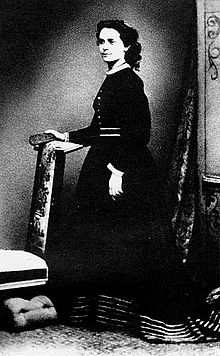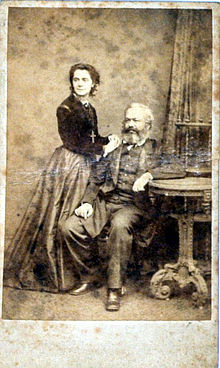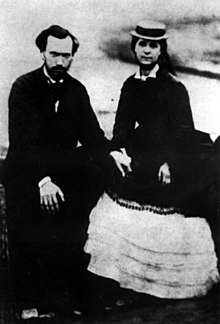Jenny Longuet
Jenny Caroline Longuet , née Marx (born May 1, 1844 in Paris , † January 11, 1883 in Argenteuil ), was the eldest daughter of Jenny and Karl Marx . She was Marx's “favorite daughter”. Her siblings were Laura , Edgar , Heinrich Edward Guy (Guido; Föxchen), Jenny Eveline Francis (Franziska) and Eleanor .
Life
In 1870 she published articles on the treatment of Irish prisoners in the French newspaper La Marseillaise under the pseudonym J. Williams . In 1872 she married the socialist Charles Longuet , they both had six children, including four sons and a daughter, who survived their mother. Jenny Marx Longuet died two months before her father, likely of bladder cancer , at the age of 38.
Her sons Jean Longuet and Edgar Longuet were also involved as French socialists.
Self-description in the poetry album
Jenny kept an English-language poetry album, to which her parents Jenny and Karl answered the questionnaire in 1865 and the housekeeper Helena Demuth and Friedrich Engels in 1868 . She signed herself up in 1865 as follows:
| question | answer |
|---|---|
| My favorite virtue ( My favorite virtue ) | Humanity ( Humanity ) |
| ... quality in man ( ... quality in man ) | Moral courage ( moral courage ) |
| ... in the woman ( ... in woman ) | Devotion ( devotion ) |
| Conception of happiness ( Idea of happiness ) | to love ( to love ) |
| ... misery ( ... misery ) | [overwritten illegible] |
| Vice that I detest ( vice I detest ) | Envy ( envy ) |
| ... excuse me ( ... excuse ) | Credulity ( credulity ) |
| My aversion ( My aversion ) | Prejudice ( prejudice ) |
| Historical persons I like least ( Characters in history I most dislike ) | Napoleon Bonaparte and his nephew Napoleon III. ( Buonaparte and his nephew ) |
| Favorite poet ( Favorite poet ) | William Shakespeare ( Shakespeare ) |
| ... hero ( ... hero ) | Gracchus ( Gracchus ) |
| ... flower ( ... flower ) | Lily ( lily ) |
| ... color ( ... color ) | Red ( red ) |
| ... maxim ( ... maxim ) | Be true to yourself ( "To thine ownself be true" [from Hamlet ]) |
| ... motto ( ... motto ) | Per aspera ad astra (German: The way to the stars is difficult.) |
literature
- Christa Krause: Birth announcement of Marx's daughter Jenny . In: Contributions to Marx-Engels Research 10, Berlin 1981, pp. 115–116.
- Emile Bottigelli: Seven unpublished documents by Friedrich Engels . In: Friedrich Engels. 1820 - 1870. Papers, discussions, documents. Editor: Hans Pelger . Verlag für Literatur und Zeitgeschehen, Hannover 1971, pp. 319–325
- Olga Meier (ed.): The daughters of Karl Marx. Unpublished letters . Cologne, 1981. ISBN 3-462-01432-3
- Robert-Jean Longuet : Karl Marx - my great grandfather . Dietz Verlag, Berlin 1979.
- Olga Vorobjowa, Irma Senelnikowa: The daughters of Marx 4th erg. revised Edition Dietz Verlag, Berlin 1984.
- Family Marx private. The photo and questionnaire albums of Marx's daughters Laura and Jenny. An annotated facsimile edition . Edited by Izumi Omura, Valerij Fomičev, Rolf Hecker and Shun-ichi Kubo. With an essay by Iring Fetscher , Akademie-Verlag, Berlin 2005. ISBN 3-05-004118-8 .
- Manfred Schöncke: A supposed youthful portrait of Marx's daughter Jenny or the photo of an unknown one? In: Communications sponsorship group archives and libraries on the history of the labor movement . No. 56 September 2019, Berlin 2019, pp. 26–30. ISSN 1869-3709
Web links
- Literature by and about Jenny Longuet in the catalog of the German National Library
- Obituary by Friedrich Engels
- Biography and article by Jenny C. Marx Longuet
Individual evidence
- ↑ Angelika Limmroth: Jenny Marx, p. 18.
- ↑ Angelika Limmroth: Jenny Marx. The biography. Berlin 2014, p. 270 f.
- ^ Family Marx private, Akademie Verlag, Berlin 2005, Fig. 4 and pp. 240–241 ISBN 3-05-004118-8
- ↑ Time history. 3, 2009, Karl Marx , page 55
- ↑ In another questionnaire she wrote: "love" Olga Vorobjowa / Irma Sinelnikowa: Die Töchter von Marx, Dietz Verlag, Berlin 1984, p. 36
- ↑ In another questionnaire she wrote: "a bad conscience" Olga Vorobjowa / Irma Sinelnikowa, p. 36
- ↑ In another questionnaire she wrote: "Cervantes" Olga Vorobjowa / Irma Sinelnikowa, p. 36
- ↑ In another questionnaire she named Antigone as the heroine: "Antigona" Olga Vorobjowa / Irma Sinelnikowa, p. 36
- ↑ See Marx-Engels works . Volume 31, after p. 391.
| personal data | |
|---|---|
| SURNAME | Longuet, Jenny |
| ALTERNATIVE NAMES | Longuet, Jenny Caroline; Marx, Jenny Caroline |
| BRIEF DESCRIPTION | Daughter of Jenny and Karl Marx |
| DATE OF BIRTH | May 1, 1844 |
| PLACE OF BIRTH | Paris |
| DATE OF DEATH | January 11, 1883 |
| Place of death | Argenteuil |


